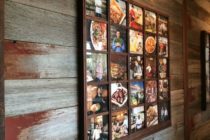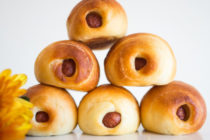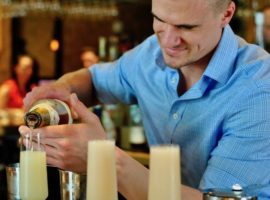“Why, sometimes I’ve believed as many as
six impossible things before breakfast.”
—The White Queen in Lewis Carroll’s Through the Looking-Glass
Whenever the world seems darker than usual, I’ve always found it pleasant if idle chitchat wanders around to the Walrus. Then it becomes possible to believe the impossible – to talk of many things, of cabbages and kings, and whether pigs have wings.
Once someone takes up the string of thought and begins to recite aloud Lewis Carroll’s narrative poem about the impromptu picnic on the beach enjoyed by the Walrus and the Carpenter, I’m all ears and salivating tongue.
Stepping into the rhyme, I see the Walrus and the Carpenter walking together. Suddenly they espy a lovely bed of oysters. The very first thing that comes into the heads of the wanderers is to eat the oysters.
“A loaf of bread,” the Walrus said,
“Is what we chiefly need:
Pepper and vinegar besides
Are very good indeed —
Now, if you’re ready Oysters dear,
We can begin to feed.”
In all fairness we should consider oyster-eating from the oyster’s point of view. Based on hints from the poem, it’s reasonable to believe that if you happen to be an oyster, you are quite aware that with age comes wisdom. To an oyster, mere survival is a mark of great intelligence.
And being quite alive, thank you, happily soaking in briny juice-baths within their shells, naturally the older ones are not at all amused by hearing themselves discussed as snack food.
Faced with a couple of fellows rudely peering into the privacy of their bedroom, the venerably aged oysters declare that they are not in the least bit ready to be eaten. And please do not call them “dear” when the objective is murder.
But the young ones – ah, the young ones. It is always the most innocent among us, the freshest as it were, that seem eager to leap into a potentially dangerous situation. As expected, the young oysters rise from their beds to follow the Walrus and the Carpenter. They see beach-walking as an adventure. And so there the young ones go, off to their doom, parading across the sand in tennis shoes.

Here is where it becomes necessary to believe the impossible. Oysters don’t have feet, of course. That the poem has them appear shod is odd, but it is a distraction of little importance. In the poem, oyster shoes are nothing more than a red herring.
The true meat of the tale is in the realization that the Walrus and his pal the Carpenter lack self-control. Even though I have admitted that, for me, appetite overrules injustice, I do not like to eat anything I have just companionably strolled along with on the beach.
Having gained the trust of a pack of young oysters, the Walrus and the Carpenter have discarded a basic tenet of good manners. Pretending to like someone just to get a free dinner is ghastly behavior, not to mention that most civilized people try to refrain from eating their friends.
Of course there is a torrent of fake weeping that takes place before the oysters are slurped up. With loud sobs and oceans of tears, the Walrus bewails the fate of his Pied Piperish followers. But while crying, the Walrus carefully selects the fattest oysters for his dinner.
And before chowing down, the Carpenter has another egregious lapse of etiquette. He tells a big fib to those innocents waiting on the half shell.
“O Oysters,” said the Carpenter,
“You’ve had a pleasant run!
Shall we be trotting home again?”
But answer came there none—
And this was scarcely odd, because
They’d eaten every one.
As we know, Nature dictates that big things eat little things. The unwavering truth of the food chain’s inexorable doom probably gave great ease of conscience to the Walrus and the Carpenter. And because of the food chain’s inexorable doom, there are a couple of morals to chew over at the poem’s end.
When you can no longer resist the craving for a platter of oysters, please, no false tears – and please, no fake buttering up. Plus, don’t lie to your food and don’t eat anything wearing shoes.
I AM THE WALRUS FRIED OYSTERS
Serves 1 comfortably; 2 begrudgingly; 3 not at all
1 container fresh Gulf oysters (12-count), drained and patted dry
The How-to:
“The time has come,” the Walrus said,
“To line up plates of three.
In the first finesse 2 eggs
To a yellowy froth for me.”
Then on Plate Two
Put flour round like moating —
Mix it up with garlic and pepper —
(Don’t take an hour!)
The trick is in the coating.
No beginning can begin
Lest final end’s in sight,
So on third plate set to the right
Shake out a panko crust —
And for goodness sake!
Cayenne and salt, a must!”
“Now, if we’re ready to assemble,
Without a tremble, dip oyster in egg,
Then into the flour—
Then it’s egg again—
Then it’s panko power.
Using hands, coat your oysters
Till fat with crumbs,
Then hoist into a heated pan
With olive oil that hums.
Cook till brown on side number one—
Then turn and cook till all is done.”
(Note: The Walrus likes to dip his oysters in pepper and vinegar, but I prefer horseradish and ketchup.)







Follow Us